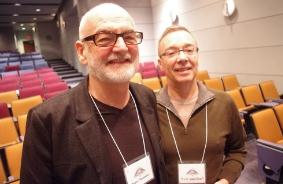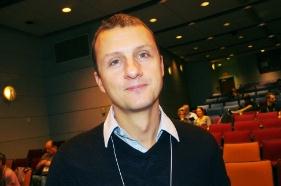
"People who are going into the workplace expecting to be out may come up to a shock when they find that the workplace isn't as supportive as they thought it was," says Terry Trussler (left, with Rick Marchand). Credit: Nathaniel Christopher photo
Gay men who are out at work make less money and are three times more likely to experience discrimination, according to the results of the 2011 Sex Now Survey.
“So people who are going into the workplace expecting to be out may come up to a shock when they find that the workplace isn’t as supportive as they thought it was,” says Terry Trussler, of the Community-Based Research Centre (CBRC), which conducts the annual Sex Now survey.
Trussler presented the latest survey findings at the eighth annual Gay Men’s Health Summit, held Nov 1 and 2 at the Simon Fraser University Harbour Centre in Vancouver.
This year’s summit, organized by the CBRC in collaboration with the BC Centre for Disease Control, focused on the social determinants of gay men’s health. The CBRC’s Olivier Ferlatte says the summit attracted more than 180 participants, the largest attendance to date.
Most of the research on gay men’s health focuses on how much risk they’re taking, Ferlatte says. “But what does that tell us when it says 30 percent of gay men are having risky sex? We don’t know the context in which it occurs; we don’t know what the factors are. I think this year we were very good with the theme ‘social determinants’ to really try to explore what the factors are that are really driving ill health, and not just HIV, but other issues such as depression and alcohol.”
The 2011 Sex Now survey, which drew more than 8,000 respondents in every province and territory, shows openly gay men on average have a higher education but a lower income than men who have sex with men but are not out at work. Fewer than half the openly gay men surveyed earn more than $50,000 per year, while 70 percent of respondents who are not out at work earn more than $50,000 a year.
Though only nine percent of the openly gay respondents felt their sexuality has hurt their careers, nearly 60 percent reported experiences of workplace discrimination.
With young gay men coming out earlier than ever, even before they get their first jobs, Aaron Poirier, Hostelling International’s human resources director, wonders how employers are preparing them for the workplace — and the workplace for them.
“The problem to me is that there are no financial incentives; there are no legal incentives to make companies good places to work for us,” says Poirier, who noted that only three provinces have specific legislation for harassment and bullying at work.
Poirier points to a report released in June by the Mental Health Commission of Canada, a federally funded non-profit organization, which highlighted the importance of the workplace in the mental health of Canadians.
“How can we come to the point where we’re saying there’s a national strategy on gay, lesbian, bisexual and trans folks in the workplace, and the workplaces have a responsibility or a role to play in this?” he asks. “What does the ideal workplace look like? Is this commission on mental health something we can leverage?”
Young gay men are also attending the health summit in larger numbers, organizers say.
“I remember when I was in my early 20s coming to the first gay men’s summit, and I was the only person under 30,” Ferlatte says. “And now we have a huge core group of young gay men who are super active in health organizations or research positions. I think we really need to engage this community and support the development of young gay men in being active in health promotion and research.”
The health summit was followed by Stepping Up to the Future of Young Gay Men’s Health, a summit for young gay men organized by the CBRC in partnership with YouthCo.
“We’re bringing people together to really reflect about what the situation is for young gay men in BC and try to build an agenda and common goals for the future,” Ferlatte says. “I don’t think that would have been possible a few years ago. So this year we felt so fortunate that we received a grant that allowed us to do that through the Shooting Stars Foundation.”
Rick Marchand, of the CBRC, believes this year’s summit is of a much higher calibre compared to the inaugural event held in 2005. “We’ve gone beyond risk behaviour to look at other health issues and ways of looking at gay men’s health.”
People want things to change, Marchand says. “They want improvements in the field of HIV prevention, and they keep talking about the different areas, but we’re only now seeing how can we move through those barriers.”

 Why you can trust Xtra
Why you can trust Xtra


